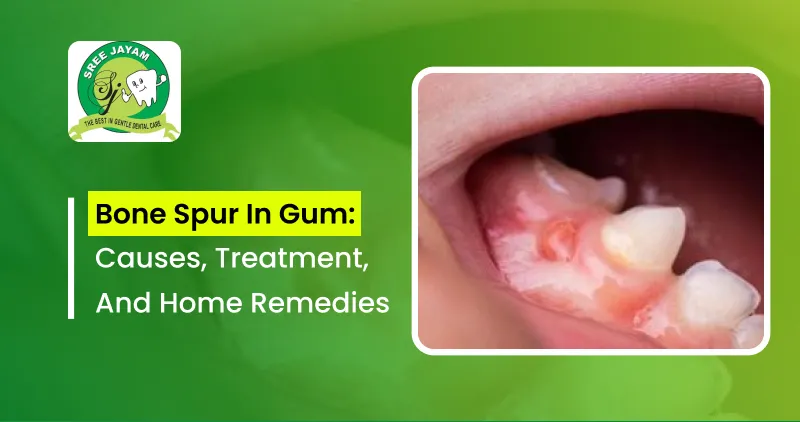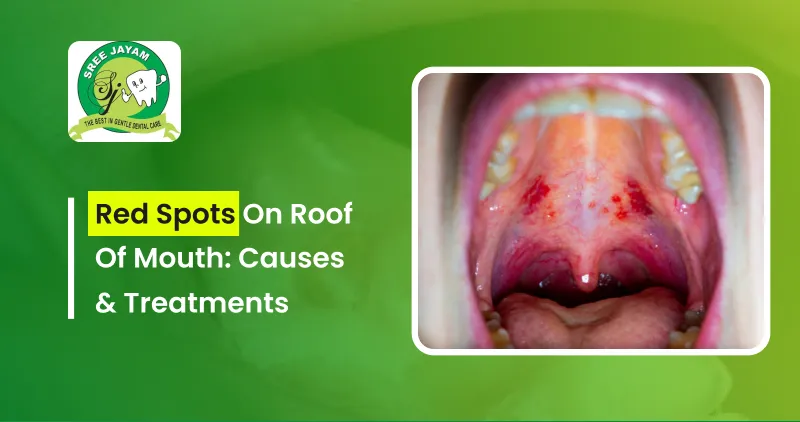
Why Does the Roof of My Mouth Hurt?
The roof of your mouth, also called the palate, can hurt for several reasons, from minor burns to infections or even more serious conditions. This discomfort may be temporary or persistent, and it can affect how you eat, drink, and speak. Many people ask, “Why does the roof of my mouth hurt?” or “Why does the roof of my mouth hurt when I eat or swallow?” If you’re experiencing this kind of pain, this blog will help you understand what might be going on, how to treat it, and when to see a doctor.
In this blog, we will see the causes of roof of mouth pain, home remedies, treatment options, frequently asked questions, and more.
Table of Contents
What Does It Mean When the Roof of Your Mouth Hurts?
The roof of your mouth, also known as the palate, consists of the hard palate (front portion) and soft palate (back portion). If you’re asking, “Why does the roof of my mouth hurt?” it could be due to inflammation, infection, injury, or even underlying health conditions.
Common symptoms include:
- Burning sensation
- Redness or swelling
- Ulcers or blisters
- Pain when swallowing or eating
Why Does the Roof of My Mouth Hurt?
There are many potential causes of discomfort in the roof of the mouth:
1. Burns and Injuries
Hot foods and drinks are the most common cause of minor injuries. Pizza, coffee, or soup can burn the palate.
2. Infections
Bacterial or viral infections such as strep throat, sinus infections, or even oral herpes can lead to sore roof of mouth and redness.
3. Canker Sores or Ulcers
These are small, painful sores that can develop anywhere in the mouth, including the roof.
4. Allergic Reactions
Food allergies may cause swelling, itching, or pain in the mouth.
5. Dehydration or Dry Mouth
Lack of moisture can irritate the delicate skin inside your mouth.
6. Oral Thrush (Yeast Infection)
Common in people using inhalers or antibiotics, this causes white patches and pain.
7. Mouth Sores and Inflammation
Conditions like pemphigus or lichen planus may cause sores on roof of mouth.
8. Trauma from Dental Appliances
Braces or poorly fitted dentures can irritate the palate.
9. Cancers or Pre-Cancerous Lesions
Persistent pain should be evaluated, especially if you see unusual patches or ulcers.
Why Does the Roof of My Mouth Hurt When I Eat?
If the roof of mouth hurts when eating, it could be due to:
- Burns from hot food
- Spicy food irritates existing sores
- Canker sores aggravated by chewing
- Infections causing pressure sensitivity
This specific symptom is common in canker sores, herpes, or palate injuries.
Why Does the Roof of My Mouth Hurt When I Swallow?
Pain while swallowing may be linked to sinus infections, throat infections, or upper palate ulcers. Roof of mouth hurts when swallowing may also point to inflammation or enlarged tonsils.
Back Roof of Mouth Hurts When I Swallow
When the back roof of mouth hurts when I swallow, it’s often due to:
- Post-nasal drip
- Inflamed tonsils
- Upper respiratory infections
- Swollen lymph nodes or soft palate inflammation
Why Is the Roof of My Mouth Sore?
A sore roof of the mouth can signal irritation, injury, or infection. This soreness may manifest as a burning feeling, tenderness, or general discomfort in the hard or soft palate. You might feel it while eating, drinking, or even speaking. Common causes include eating hot foods, canker sores, oral thrush, dehydration, or trauma. Sometimes, the pain is mild and goes away on its own, but if it lasts more than a few days or is accompanied by swelling, fever, or white patches, it’s important to consult a healthcare professional. Identifying the reason behind the soreness is key to effective treatment and relief.
Why Is the Roof of My Mouth Swollen?
Swelling may be caused by:
- Allergies
- Infection
- Trauma
- Nutritional deficiencies
Why is the roof of my mouth swollen is a concerning symptom if it doesn’t go away quickly.
How to Treat Sore Roof of Mouth?
Treatment depends on the cause:
- Avoid spicy or hot foods
- Use a salt water rinse
- Apply cold compress (ice chips)
- Use OTC oral gels
- Maintain good oral hygiene
If pain persists, consult a dentist or doctor.
Home Remedies for Sore Roof of Mouth
1. Salt Water Rinse
A warm saltwater rinse is one of the oldest and most effective remedies for oral discomfort.
- How to do it: Mix 1/2 teaspoon of salt in a cup of warm water and swish it around your mouth for 30 seconds.
- Why it works: Salt helps reduce inflammation, fights bacteria, and speeds up healing of ulcers, sores, or burns.
- How often: Use 2–3 times a day.
2. Cold Compress or Ice Chips
Cold therapy can quickly ease pain and reduce swelling.
- Suck on small ice chips or place a cold compress outside the mouth, near the sore area.
- This is especially helpful if the pain is from a pizza burn, hot soup, or trauma.
- Avoid applying ice directly to the sore — it may irritate further.
3. Aloe Vera Gel
Aloe vera is known for its soothing and healing properties.
- Use only food-grade or oral-safe aloe vera gel.
- Apply a small amount to the sore area with a clean finger or cotton swab.
- Helps reduce inflammation, soothe irritation, and support healing of ulcers or burns.
4. Avoid Irritating Foods
Certain foods can delay healing or worsen the pain.
- Avoid: Spicy dishes, citrus fruits, hot beverages, salty snacks, and crunchy chips.
- Opt for: Soft, cool, and bland foods like yogurt, smoothies, mashed potatoes, and applesauce.
This dietary change protects the affected area while it heals.
5. Stay Hydrated
Dry mouth can worsen soreness and slow healing.
- Drink plenty of water throughout the day.
- Avoid caffeine, alcohol, and sugary drinks, which can contribute to dryness.
- A moist mouth environment helps prevent further irritation and supports faster recovery.
6. Over-the-Counter Oral Gels
For quick pain relief, consider numbing gels or mouth ointments.
- These provide temporary relief by numbing the sore area.
- Always follow the label instructions and avoid overuse.
7. Maintain Good Oral Hygiene
Keeping your mouth clean is crucial during the healing process.
- Use a soft-bristled toothbrush to avoid irritating sore areas.
- Rinse with an alcohol-free mouthwash or mild antiseptic solution.
- Brush twice daily and floss gently to prevent plaque buildup.
Maintaining a Healthy Roof of Mouth
To keep a healthy roof of mouth:
- Brush and floss regularly
- Avoid hot, spicy, or crunchy foods
- Stay hydrated
- Visit your dentist for regular check-ups
Sores on Roof of Mouth Pictures
Here are sores on roof of mouth pictures to help users identify symptoms. If you notice ulcers with white centers or red edges, they might be canker sores. Clusters of small blisters could mean herpes simplex.
When to See a Doctor
Seek medical help if:
- Pain lasts more than a week
- You have difficulty eating or drinking
- You see abnormal growths
- There’s unexplained weight loss
Conclusion
In this blog, we answered the question, “Why does the roof of my mouth hurt?” and covered multiple symptoms like roof of mouth hurts when eating or roof of mouth hurts when swallowing. Whether caused by burns, infection, or something more serious, it’s important to identify the issue early. Remedies such as cold foods, rinses, and maintaining oral hygiene help most cases. Persistent or painful symptoms warrant medical attention.
Frequently Asked Questions
It may hurt due to burns, sores, infections, or dental appliances. Identify the cause to choose the right remedy.
Hot or spicy foods often irritate existing ulcers or injuries, making pain worse.
Infections or inflammation in the soft palate or throat often cause this symptom.
The top (palate) can hurt from various issues—trauma, infection, dehydration, or allergy.
It should be smooth, moist, pink, and painless.


















